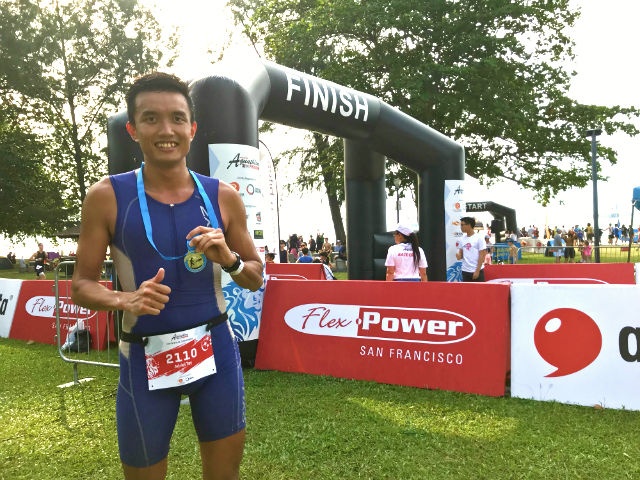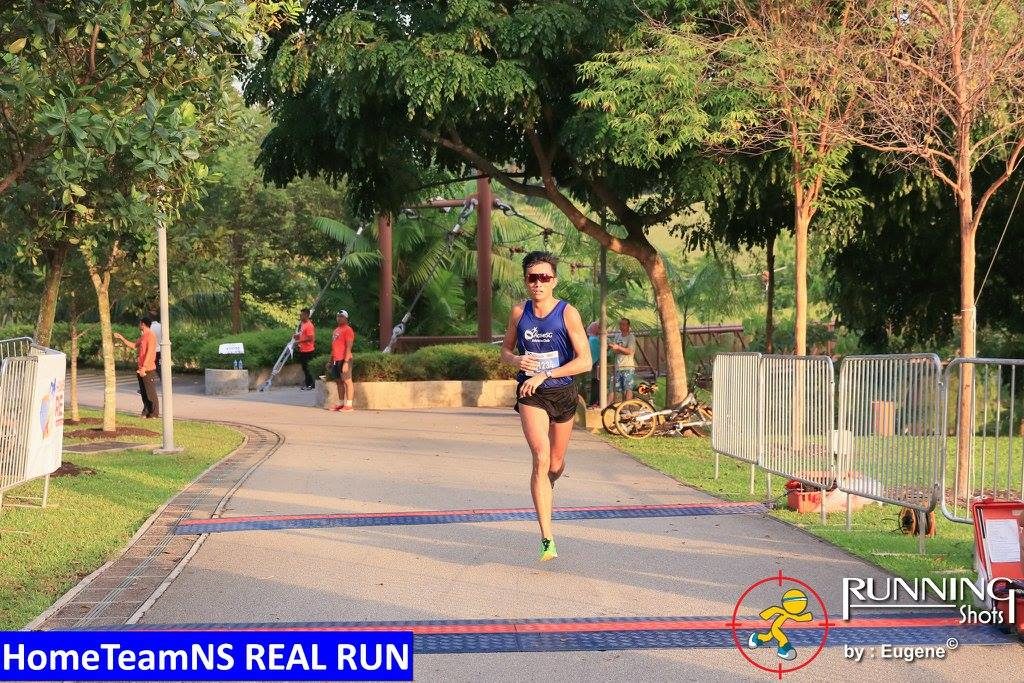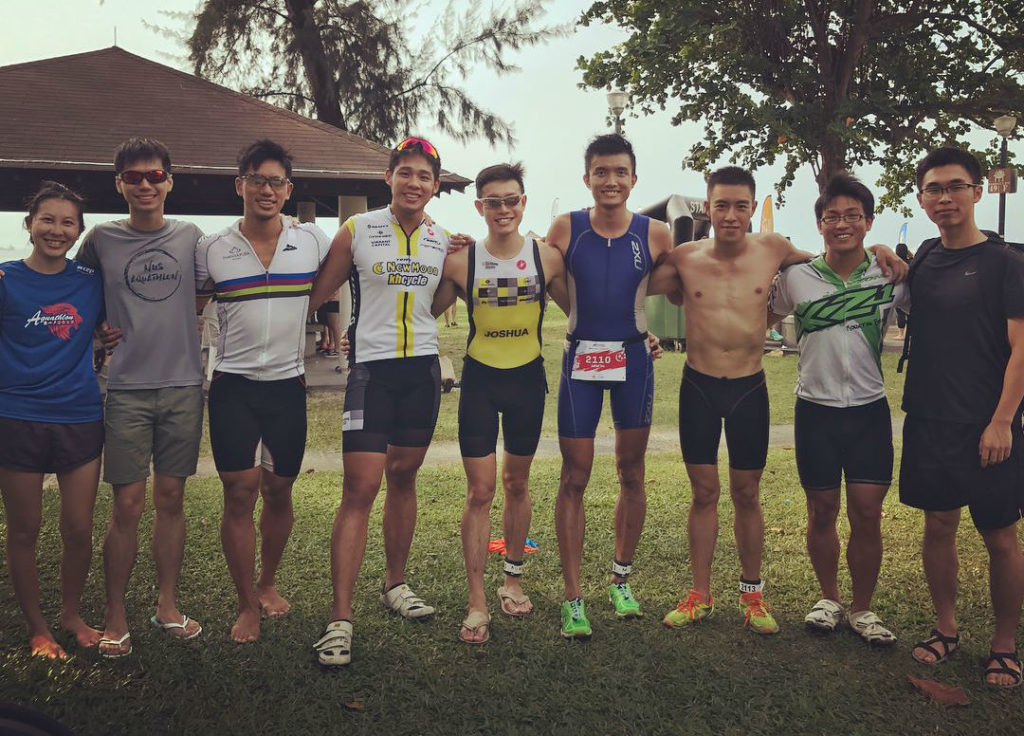Though Adriel Tay comes from a swimming background, he spends most of his time these days on running, so he basically considers himself a runner rather than a multi sports athlete.
Said Adriel, 26, a Medical Officer in the army, “I had been swimming from a very young age and then in Junior College, I took up running because my Physical Education teacher told me to give it a go. I took it from there and have never looked back. I started to cycle during my uni days, too. But nowadays I haven’t been doing much swimming. I have been mainly running.”

Adriel Tay at last Sunday’s Singapore Aquathlon, which he won.
Has picked up recent wins and podium placings
But despite his focus in running though, Adriel has still managed to picked up some wins in Aquathlon events, which consist of both a swim and a run.
For instance, he won the Standard Distance Singapore Aquathlon (1,500m swim + 10km run) at East Coast Park last Sunday, as well as the MetaSprint Aquathlon (750m swim + 5km run), which took place at Sentosa in February this year.
Said Adriel, “My swim time was not very good at the Singapore Aquathlon but my good run had helped me to finish on top.”
Adriel, who specialises in the 5km and 10km running race distances, has a 5km personal best of 16min 33sec, which was achieved on the track, and a 10km personal best of 35min 08 sec, which he had successfully achieved at the Home Team NS Real Run, earlier this month.
He also does well at running races too. At the recent Home Team NS Real Run, he had came in the top ten, finishing the race in seventh position in addition to clocking his personal best there.
Run Training
To train for his runs and his other sports events, Adriel does three core sessions of running per week, clocking an average of 50 – 60km each week.

Adriel does three core run sessions per week.
Adriel’s three core workouts are an interval session, a mid-distance run and a long run. He said, “To run well, the long run has to be double the distance of your race, so for me, I race 10km which means that I would run 20 – 25km per week at MacRitchie Reservoir.”
He added, “Speed work helps with certain aspects of the race, like the photo finish at the end. That gives you the kick that you need to push hard when you see the finishing line approaching. Interval sets have to be much faster than race pace; you will be taking a rest between sets so that makes it easier.”
And for the mid distance runs, according to Adriel, these are basically tempo sessions. He said, “The mid distance runs have to match my race pace. So this means that if I am aiming to race 10km, I will cover 15km at race pace, or else a slight bit slower than race pace.”
Cross Training
Besides running, Adriel also does 1 hour of swimming per week too, and this consists of two 30min sessions at his camp swimming pool. But these days, he treats his swim sessions as cross training for his running.
Said Adriel, “I have not done a triathlon in a long time and I am not a strong cyclist; my swim sessions are basically used to recover from my run training. I have been doing much more running than swimming; in fact my training week consists of 95% running and 5% swimming.”
He added, “Doing cross training such as swimming definitely helps runners. Sometimes we can do easy runs to recover and clear lactate from the hard sessions; but I think that swimming is better though because it has zero impact on the body.”
As part of his cross training, Adriel also goes to the gym weekly, where he will train his core.
Said Adriel, “I run three times a week and in between are basically easy runs and gym sessions; at the gym, I focus more on my core and lower limb. I do not really do upper limb; that may not be the correct thing to do though! I incorporate weights though where I do light weights but more repetitions. My aim is not to build muscle but to improve my strength for running.”
He continued to explain that if the target is to build muscle, athletes would have to do heavy weights and lower repetitions instead.
Adriel added, “Gym work helps runners; it is a great form of strength training and helps you to hold your run pace longer and also maintain your race pace for a longer period of time.”
Other aspects to run well besides just training
However Adriel pointed out that doing running training is one thing; there are also plenty of other aspects in order to run well.

Running well is about much more than simply training, says Adriel.
He explained, “I learnt from my run coach (Steven Quek) that it is one thing to train hard, but it is just as important to get adequate rest, of about eight to nine hours of sleep per night. You also have to eat well and have a healthy diet.”
Adriel continued, “I am trying to sleep earlier and I am getting better at it, but I must confess that I still like to eat junk food.”
And to run efficiently, he also explained that having good run form in the first place, is important too. Said Adriel, “Runners need to focus on their form and economy. It is not just about running; there are many aspects required, to engage the running muscles. Having good cadence and foot strike also play a part in how effectively you can run.”
Train the mind
Training the mind is also crucial for running, Adriel added, especially when the going gets tough in a running race.
He said, “The mental aspect is important; you know, when it gets hard, how hard can you push yourself? My coach has said that I am not strong mentally and that I don’t perform to my running potential.”
Continued Adriel, “I am still trying to figure out how to improve that though; I think some of the top runners share tips, and I am trying to mimic them, but it is easier said than done! This may be hard to quantify, but it’s something that will be useful and runners should work on developing a strong mind too, in addition to their physical training, though.”
Race Smart
Adriel also shared that when it comes to running races, a lot of runners have no discipline and they tend to go out too fast. He said “I made this mistake too, in the past. But I learnt that you need to hold it in at the beginning and do not go too fast; you can sprint for the first 100m but that will affect you mentally and physiologically for the rest of the race because you’ll already be tired by then.”
He added, “Instead, race smart; hold back and everything will even out by the end of the race.”
Runners need patience
Also, Adriel pointed out, based on his own experiences, that runners need patience when it comes to recovering from injuries. He said, “A lot of runners get impatient that they cannot train, so they jump back into training when they are not fully recovered yet. I have had injuries before and I know what it feels like when you cannot stand the thought of missing out on training.”

Runners need to have patience when it comes to injuries, says Adriel.
He continued, “But really, you have to allow the recovery to take place; do your easy runs and swims and do not rush back into training before you are recovered. Seek out a doctor or physiologist to manage these injuries too.”
Adriel’s last serious injury had been a stress fracture, which he had sustained because he did lots of skipping barefoot and on concrete ground, but that was many years ago, and he has been injury free since then.
Said Adriel, “I have been lucky to be injury free for a long time. But I have come to realise that injuries are a big thing for runners and you really need to let your body recover fully from it.”

Leave a Comment